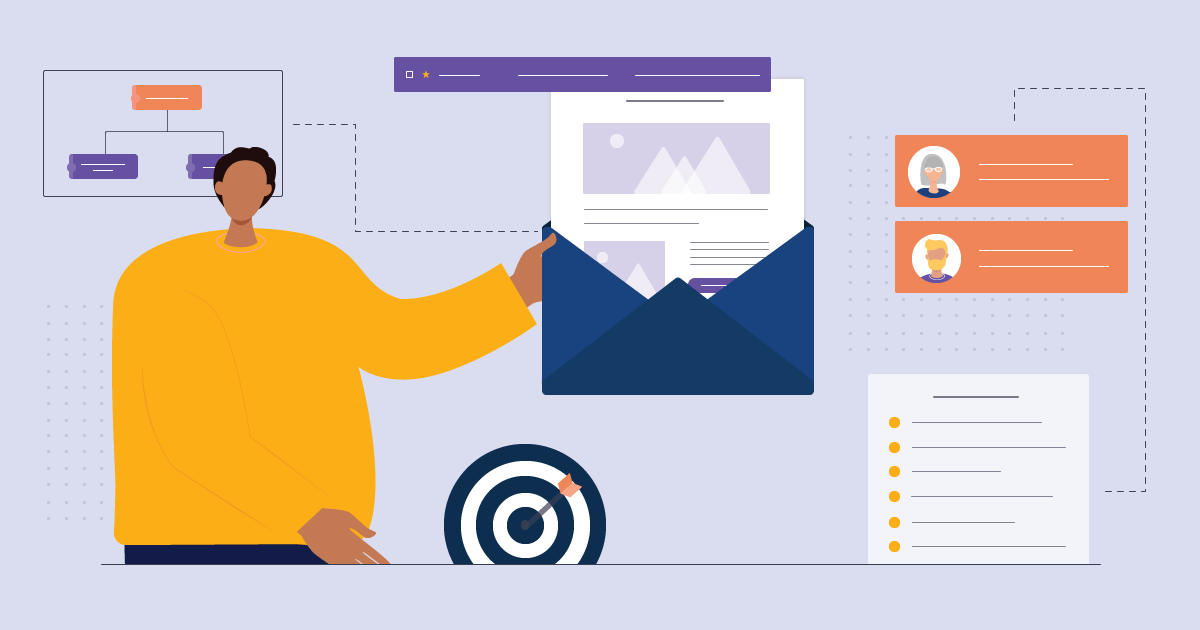
7 Best Enterprise Email Marketing Software Solutions In 2026
Enterprises today face a highly competitive landscape where delivering personalized content is important to succeed.
Channels such as paid ads and social media marketing have long helped businesses like Tesla, Apple, and Amazon enhance brand awareness and drive revenue. However, benefiting from channels with the highest ROI is crucial for a thriving corporation.
Email marketing, in our case, offers according to Litmus an impressive ROI of $40 for every $1 spent by brands in the US. This shows the effectiveness and importance of enterprise email marketing software to reach and engage customers.
In this post, we’ll analyze some of the top email marketing platforms suited for enterprise-level usage. Also, we’ll explore their best features, pros and cons, and pricing to help you make an informed decision.
Disclaimer: The information in this post is accurate as of May 2024.
Drive results with enterprise-grade email software
Give your team the edge with powerful deliverability and reporting.
Try MoosendHow to Choose the Right Email Marketing Software for Enterprises
Before you start exploring your options, you need to specify your needs and use cases.
For example, organizations seeking email software for internal communications should look for tools that offers ease of use, enhanced security, integration, and effective communication within large teams.
On the other hand, if you want to run an effective enterprise email marketing strategy, your team will need advanced features and functionality, such as personalization.
Here’s what to look for:
- Compliance and security: It needs to comply with legal standards such as GDPR and CCPA, to protect your organization and customers.
- SSO & SAML authentication: These processes will ensure a secure and efficient environment that aligns with the overall IT infrastructure and security policies.
- Advanced email builder: A user-friendly email editor lets you design various campaigns without any coding expertise. Pre-made templates are also a plus and will save time and effort.
- Powerful segmentation and personalization: It’ll let your team tailor content to meet the specific needs and interests of different customer segments.
- Real-time analytics tools: Detailed metrics will track and measure the effectiveness of email campaigns, refining your strategy and improving ROI.
- Marketing automation features: Email automation streamlines tasks and increase content relevance by sending triggered emails based on specific actions or behavioral patterns.
- CRM integration: Seamless integration with customer relationship management systems will help your team leverage customer data for more targeted email campaigns.
- A/B testing capabilities: Enables testing of different variations of an email campaign to find the version that drives better engagement and conversion.
- Customer support: A responsive, 24/7 customer support through various channels (phone, chat, and email) is crucial to deal with urgent issues.
- High deliverability rates: Manage sender reputation, avoid spam filters, and ensure emails reach the inbox.
- User access: Provides granular access controls to manage who can view, edit, or send campaigns, crucial for maintaining security in large organizations.
The most important thing you should consider when choosing enterprise-level software is whether it can handle large volumes of emails and grow with your needs without sacrificing performance or reliability.
Email Marketing Platforms for Enterprises: Comparison Table
Our selection includes different email services to cover various digital marketing needs, including internal communications and marketing campaigns, for industries like SaaS, eCommerce, and more.
Let’s take a first look at them below:
| Best features | Cons | Trial/Demo | |
| Moosend | Audience discovery, high email deliverability | Limited number of integrations | Free trial, demo |
| ActiveCampaign | Custom data management (objects) | Steep learning curve | Free trial |
| Brevo | Multi-user access | Poor email deliverability | Demo |
| Mailchimp | Multivariate testing | Limited email creation customizations | Free trial |
| HubSpot Marketing Hub | Built-in CRM | Takes time to fully understand | Demo |
| Salesforce Marketing Cloud Engagement | AI-powered insights | Requires technical proficiency | Free trial |
| Adobe Marketo Engage | Lead scoring and nurturing | Outdated and slow interface | Demo |
Now, let’s examine their best use cases, features, pricing, strengths, and weaknesses in more detail.
Best Email Marketing Platforms for Enterprise by Use Case
- Moosend – Best for powerful automation and segmentation tools with a minimal learning curve.
- ActiveCampaign – Best for complex marketing automation and native CRM integration.
- Brevo – Best for multichannel marketing and user-friendly tools.
- Intuit Mailchimp – Best for advanced customer journeys and multivariate testing.
- HubSpot Marketing Hub – Best for managing contact lists through their powerful CRM.
- Salesforce Marketing Cloud Engagement – Best for AI-driver personalization.
- Adobe Marketo Engage– Best for lead generation and nurturing for B2B.
1. Moosend
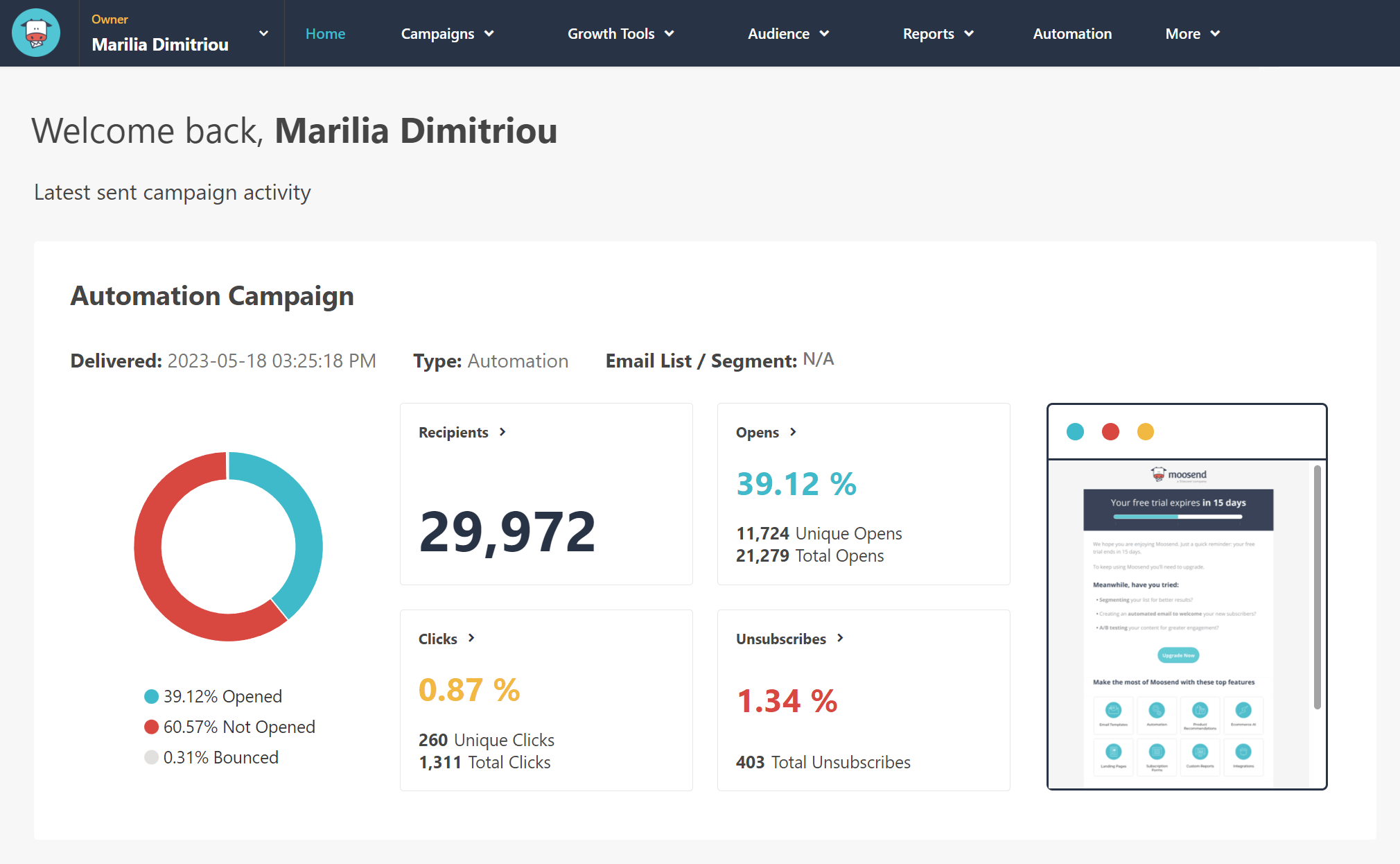
Moosend is a powerful email marketing and marketing automation tool suitable for enterprises or businesses transitioning to larger operations.
This platform will offer your team everything they need to create, send, and optimize marketing campaigns. The drag-and-drop editor favors usability and customizability while the learning curve is minimal. Regarding its automation features, Moosend offers advanced workflows with numerous triggers to create complex sequences, including re-engagement, abandoned cart, and welcome emails.
Moreover, Moosend’s Audience Discovery enterprise-level tool will boost eCommerce marketing by analyzing user interactions and purchase history to create dynamic, AI-driven segments. Apart from that, your team will get access to landing pages, forms, dynamic content, and autoresponders.
Lastly, enterprises will get custom reports and SSO & SAML authentication to ensure control over access to sensitive marketing data and campaigns. A dedicated account manager will also assist you during setup and help you optimize your strategy. Moosend offers a service-level agreement (SLA) to set clear expectations, ensure quality service, and provide a clear framework for resolving potential issues.
Best Features
- Audience discovery
- Single sign-on (SSO) & SAML
- Segmentation based on demographics, locations, and more
- Multi-step marketing automation workflows
- Custom reporting
- Dedicated IPs
- 10+ team members
- Dedicated account manager
- 100+ integrations with CRM, eCommerce, WordPress, and more
- Priority support via phone, email, and chat
Pros
- Excellent email deliverability & strategy optimization
- Powerful AI-powered tools, such as eCommerce AI, generative AI for email content authoring and subject line optimizer
- Easy to set up, with a minimal learning curve
- Robust analytics and reporting, offering detailed insights into campaign performance (open rates, click-through rates, unsubscribes, etc.)
- Unlimited marketing campaigns and transactional emails
- Very responsive and helpful customer support team
Cons
- No SMS marketing features
- Certain limitations in form design capabilities and customizations
- Limited number of integrations for the time
Pricing: Moosend’s pricing structure is based on the number of contacts you have. You can try the platform for free by signing up for the 30-day free trial. For more information, you can contact sales to get a quote.
Further reading: Pros and cons are based on numerous customer reviews. For more, you can check G2. You can find out more about the platform by reading Forbes’ recent review.
2. ActiveCampaign
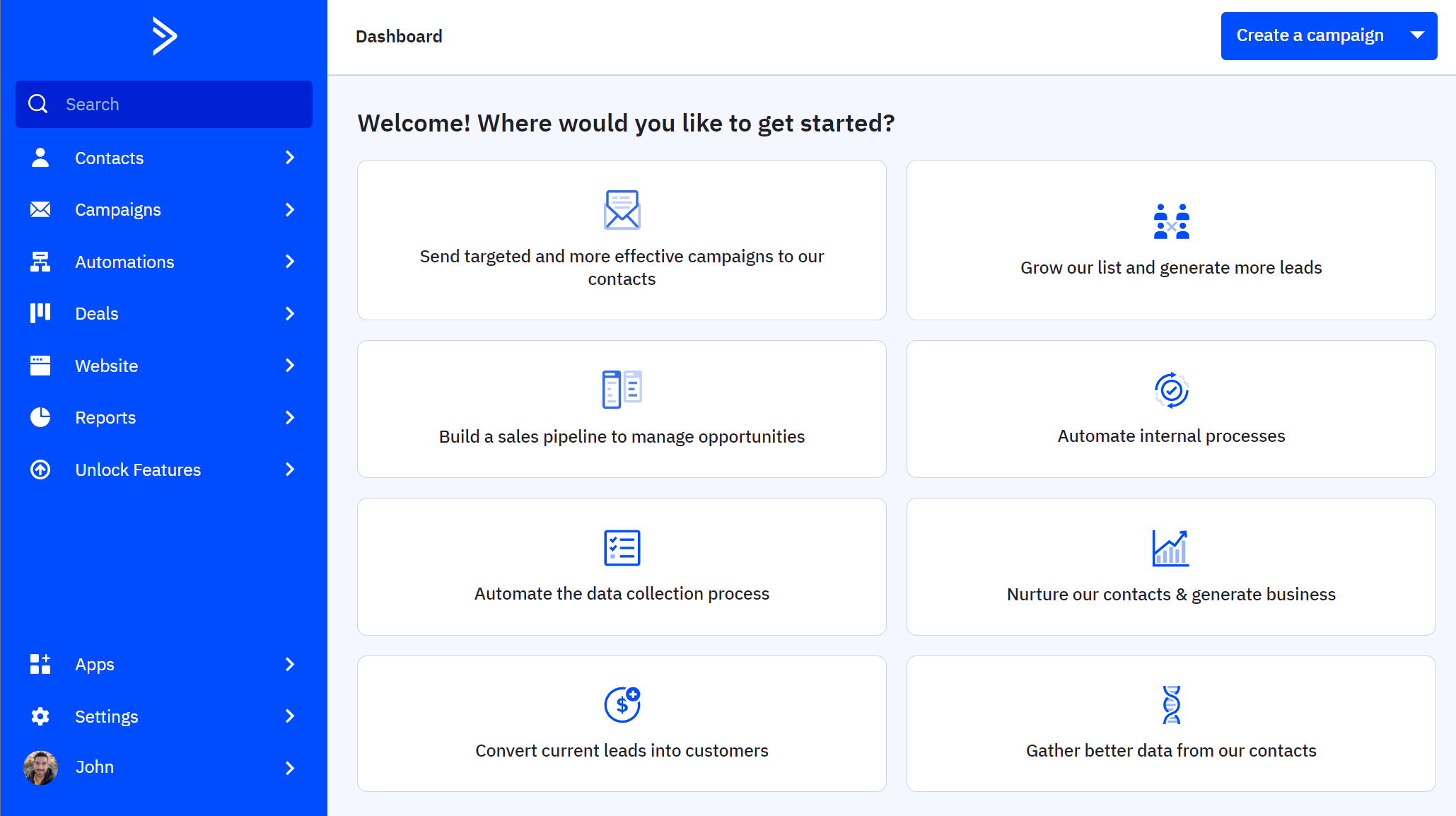
ActiveCampaign is another great option with robust marketing automation features. However, since the tool is quite advanced, your team should have experience working with similar tools. If not, then you need to be prepared for the steep learning curve.
Regarding the enterprise-level features, ActiveCampaign will give you access to custom reporting to build reports based on specific customer data and customize your dashboard with the information your team needs to monitor. Your teams (up to 10 users) will also get access to custom objects, a tool to manage data more efficiently.
Apart from these, ActiveCampaign offers various email marketing and marketing automation tools to help every aspect of your strategy, including lead scoring, online forms, split automations, and more. Your team can easily build campaigns and automate them through the workflow builder. API and Webhooks are also included to connect the software to your apps.
Lastly, SSO and HIPAA support are available for enterprise clients, while ActiveCampaign’s SLA will ensure the security of your operations.
Best features
- Custom reporting
- Custom data management (objects)
- SSO authentication
- HIPAA Support
- Unlimited email testing
- SMS add-on
Pros
- Can cater to various marketing needs from email campaigns to multi-channel marketing strategies
- Offers many integrations with popular tools (Salesforce CRM, Shopify, etc.)
- Powerful automation capabilities
- Extensive training and onboarding materials
Cons
- Occasional slowdowns during peak business hours
- The quality of support can be inconsistent
- Steep learning curve for new users
- Reporting tools are not very user-friendly or easy to customize
Pricing: ActiveCampaign’s Enterprise plan starts at $323/month for 2,500 contacts. For more than 50K subscribers, you should request a custom quote.
3. Brevo
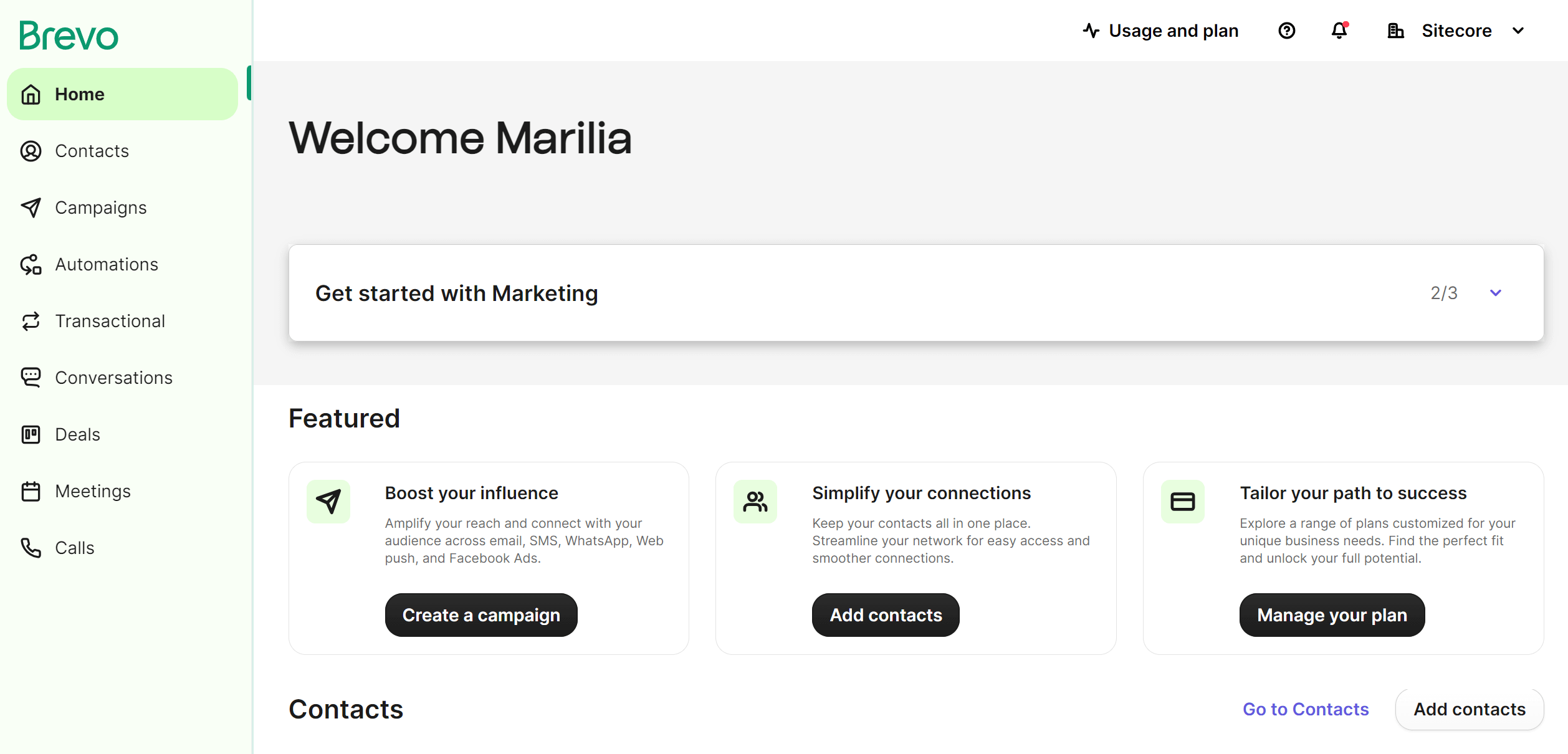
Another enterprise email marketing software you should consider is Brevo (formerly Sendinblue).
The software will provide your team with customizable templates, reliable automation, and seamless integration with other tools to streamline your work.
Moreover, Brevo users have noted its user-friendly interface and excellent customer support. However, some find the analytics a bit lacking and wish for better email deliverability as it seems to be underperforming. This is very crucial to ensure your email marketing campaigns reach your subscribers’ inbox.
Enterprise clients will also get access to sub-account management, enterprise-grade security and tailored onboarding to ensure your team learns how to use the platform the right way.
Best features
- Sub-account management
- Predictive sending AI
- Personalized support (phone)
- Multi-user access
- Advanced statistics
- SMS & WhatsApp campaigns
Pros
- Supports various marketing channels including email, SMS, and WhatsApp
- Has a responsive and helpful customer support team
- Supports marketing campaigns in multiple languages
- Provides a wide variety of customizable templates for emails, newsletters, and landing pages
Cons
- Automation triggers can be confusing and sometimes don’t work as expected
- Difficulty in reversing blocklisted contacts and managing subscriptions via automation
- Issues with integration concerning opt-ins and subscription management
- Poor email deliverability according to numerous delivery tests
Pricing: Brevo has a dedicated Enterprise plan that you can see through the available demo. If you want more options similar to it, you can explore Brevo’s best alternatives to make a more informed decision.
4. Intuit Mailchimp
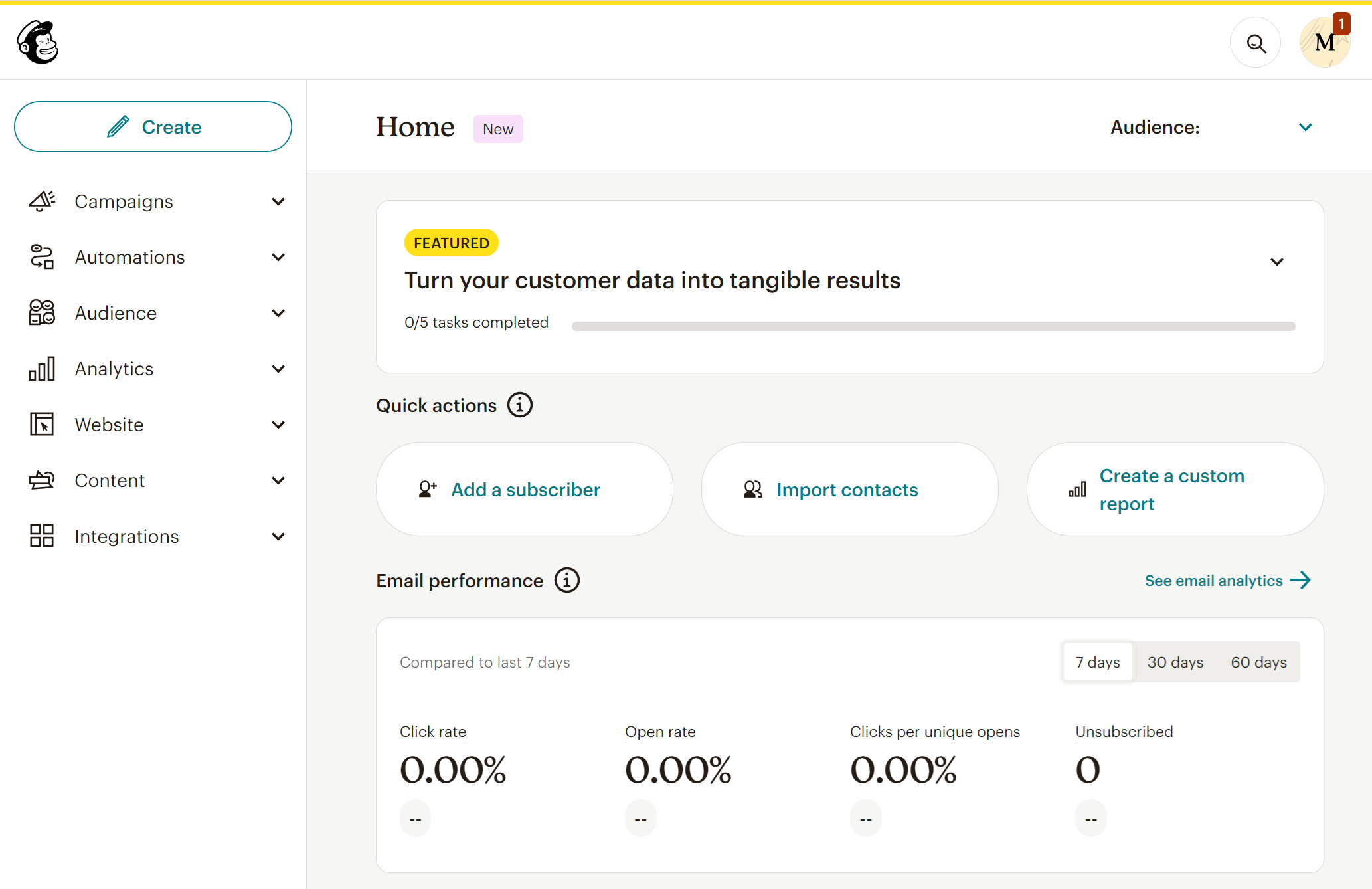
Mailchimp is a popular email marketing tool that you should consider for your team. The platform offers an array of email marketing and marketing automation tools, along with lead generation and contact management features to keep everything organized.
Mailchimp offers an intuitive email builder and pre-made templates to speed up the creation process. While the tools are easy to use, setting up everything may be, according to Mailchimp users, a tad difficult which means your team needs to be prepared for the learning curve.
Moreover, the customer journey features are quite robust, allowing you to build complex email automation sequences for your audience. The enterprise-level plan (Premium) will give you access to unlimited seats and audience, while you’ll also receive dedicated onboarding and a customer success manager to help you complete the process smoothly.
Best features
- Automated customer journeys
- Generative AI tools (beta)
- Multivariate testing
- Priority phone support
- Content optimizer
- Send time optimization
Pros
- Extensive and up-to-date email template library
- Very detailed analytics for tracking campaign performance
- Powerful customer journey builder with numerous triggers and actions
- Large number of integrations with various tools, including social media networks and CRM systems
Cons
- Slow and sometimes inadequate support responses
- Limited customization options for email creation
- Complicated setup for new users, especially with importing email lists and automated responses
- Charges for duplicate contacts and unsubscribes
Pricing: Mailchimp offers a Premium plan starting at $350/month for 10K subscribers. For more than 250K contacts, you should contact sales. A free trial is available to try the software.
Further reading: If you liked Mailchimp but you’re looking for a more user-friendly option for your team, you should consider one of Mailchimp’s best alternatives.
5. HubSpot Marketing Hub
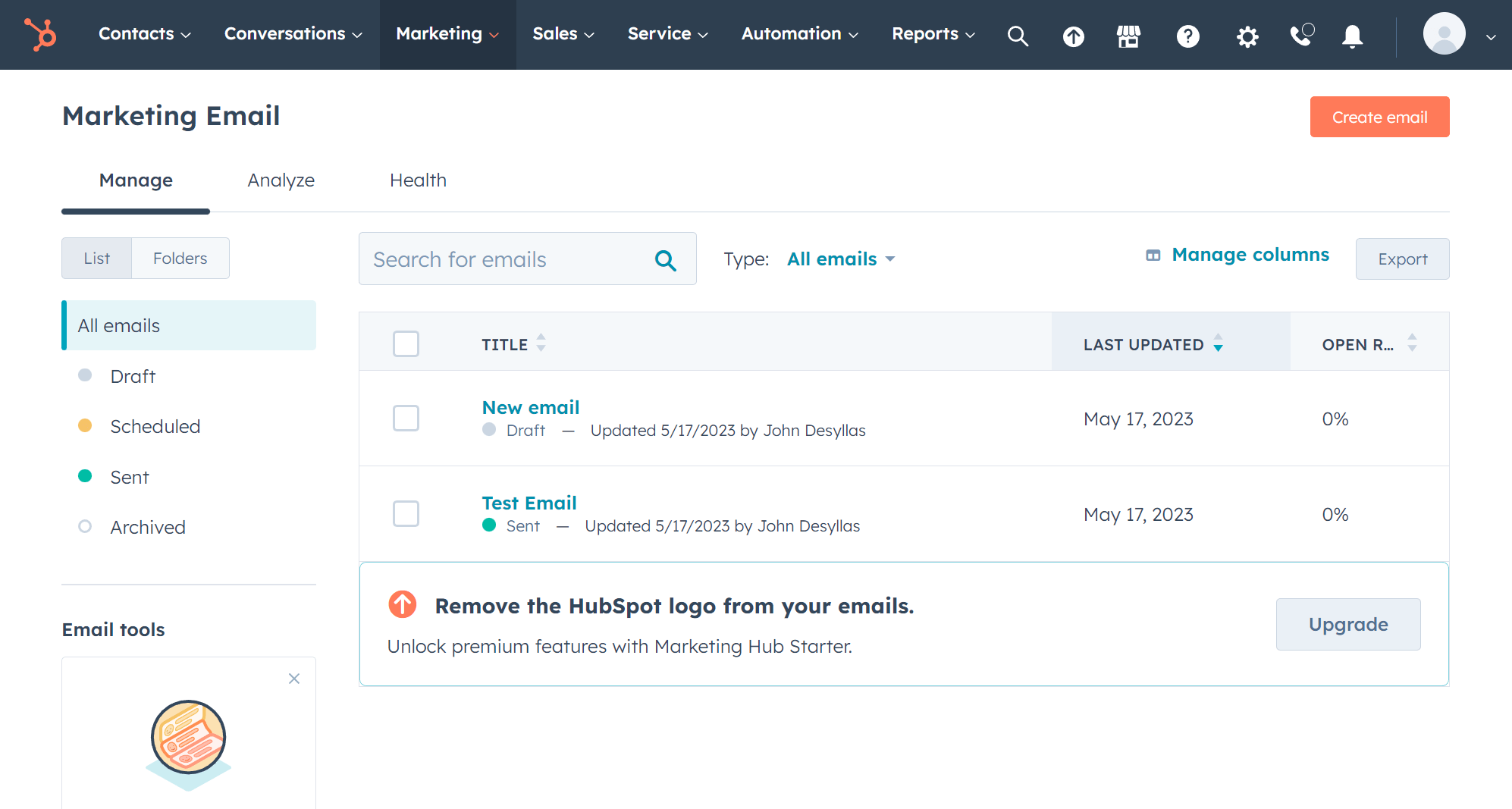
HubSpot Marketing Hub is another robust enterprise email marketing solution you can consider designed for B2B SaaS marketers.
The platform has a powerful contact management system (CRM) that your team can use to keep customer data organized and enhance sales and marketing. So, if you want a tool to combine your efforts and increase your personalization efforts, HubSpot will let you integrate them seamlessly.
Moreover, this platform enables Account-Based Marketing (ABM), revenue attribution, and custom workflows to enhance your teams’ efficiency in reaching high-value customers. While users have noted its excellent customer support, HubSpot’s pricing tiers, database management, and the need for more advanced customization options are some of the drawbacks you should consider before committing.
Best features
- Multi-touch revenue attribution
- Custom events and objects
- Customer journey analytics
- Up to 300 teams
- User permissions (content & data)
- Built-in CRM
Pros
- Complete suite of tools including contact management, email marketing, landing page building, conversations, ads, and ABM (Account-Based Marketing) features
- Immediate chat assistance and extensive documentation
- Advanced workflows and numerous integrations with popular third-party apps
- Very detailed analytics and reporting tools to track campaign performance, identify areas for optimization, and measure the impact of their marketing efforts
Cons
- Takes time to fully understand and use all the available features
- Social media capabilities are seen as limited, and there are issues with duplicate records and database management
- Limited advanced customization options, particularly in email design and workflow configurations
- Users feel the need for more strategic guidance from Customer Success Managers (CSMs) to better leverage the platform’s full potential
- The plan starts with a small number of subscribers for a high price
Pricing: HubSpot pricing for the Marketing Hub Enterprise is $3,600/month for 10K contacts and 5 seats. The one-time Enterprise onboarding also has a fee of $7,000. A free plan is available, but you can only explore the core features. For more information, you need to contact sales.
Further reading: You can find out more tools like HubSpot by exploring its best competitors.
6. Salesforce Marketing Cloud Engagement

Marketing Cloud Engagement is another enterprise email marketing platform that leverages AI to create and deliver personalized campaigns. It allows businesses to use real-time customer data at a scale to design tailored customer journeys and automate experiences across the entire lifecycle.
The platform also supports multichannel messaging, including highly personalized email and mobile app engagement, and offers advanced analytics to optimize campaign performance. You can also enhance brand-customer relationships through conversational marketing for appointment confirmations, surveys, and preference building for better customer experiences. You can further maximize these capabilities by partnering with a Salesforce Marketing Cloud agency, which helps design, execute, and optimize personalized multichannel campaigns for better engagement and ROI.
Integration with tools like Google Analytics and additional features such as Marketing Cloud Personalization and Loyalty Management are also available to streamline your operations.
Best features
- Journey builder
- Mobile messaging
- AI-powered insights
- Global platform
- Multiple business units
Pros
- Integration with Salesforce CRM for a unified customer view
- Strong focus on compliance and secure practices
- Drag-and-drop features for non-technical users
- Automated marketing journeys across multiple channels
Cons
- User interface can be overwhelming and less intuitive
- High pricing structure, prohibitive for smaller enterprises
- Requires technical proficiency for effective customization and use
- Difficulties in integrating with other systems
Pricing: The tool has three paid plans. The Professional and Corporate are $1,250/org/month and $4,200/org/month (billed annually) respectively. For the Enterprise, you need to request a quote.
7. Adobe Marketo Engage
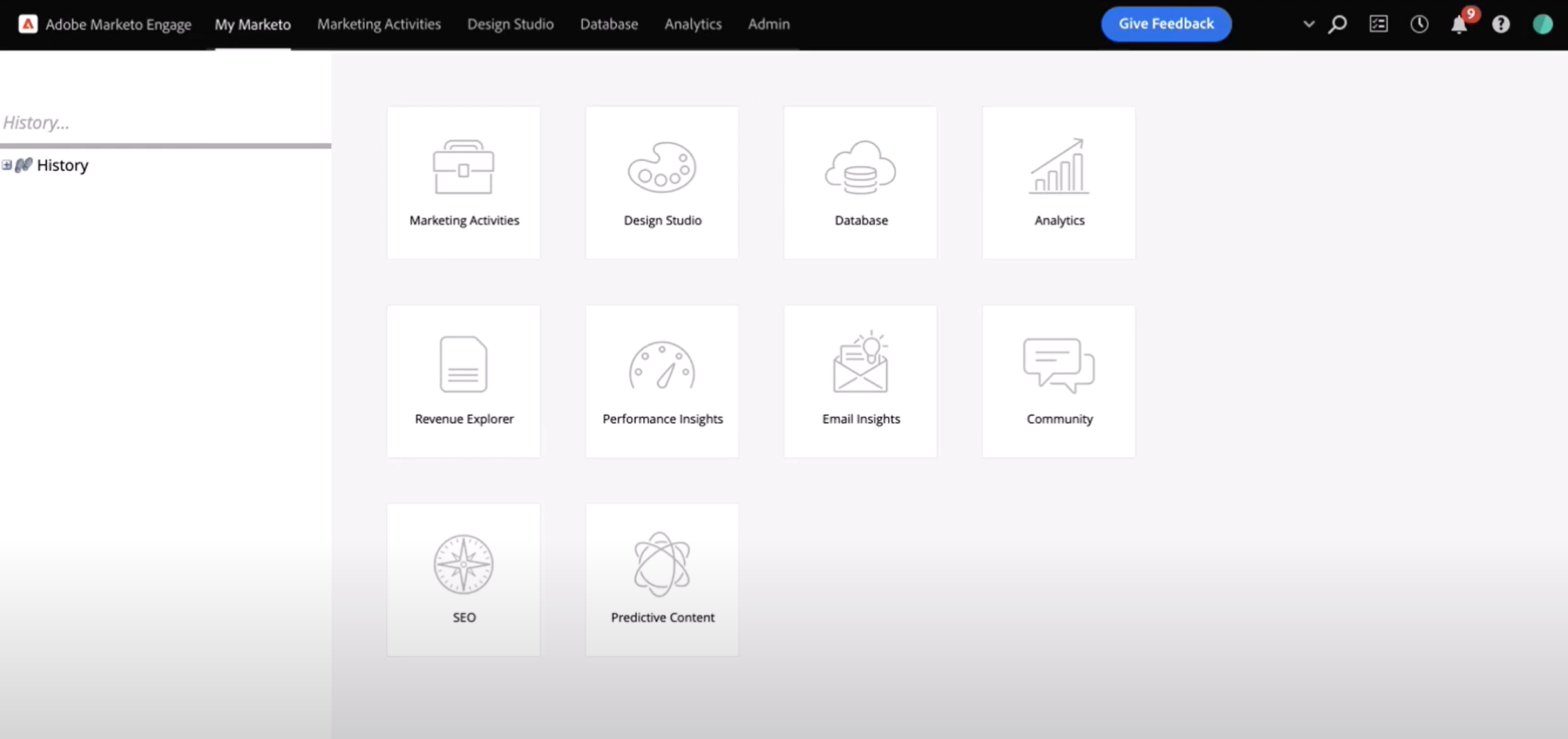
Marketo Engage by Adobe is a great option for enterprises, offering email marketing and marketing automation functionality to engage customers.
This solution will let your team build predictive segments for more targeted marketing, and nurture leads across multiple channels. They can then personalize customer experiences by deploying triggered content based on behavioral data. The advanced flows will also help your sales and marketing teams engage valuable customers and enhance their journeys.
Apart from that, Marketo Engage offers generative AI for quicker email creation, interactive webinars, scalable AI-driven chatbot interactions, and embedded scheduling tools on landing pages. Additionally, it integrates with Adobe’s suite, to optimize B2B marketing journeys.
Best features
- Real-time reporting and analytics
- Daily API calls
- Generative AI authoring
- Active listening and triggered content
- Lead scoring and nurturing
Pros
- Integrates seamlessly with various third-party tools such as webinars, AdWords, CRM, and social accounts
- Customer support is efficient, with quick responses and helpful resources from the community
- Offers numerous campaign optimization tools
Cons
- It requires significant training to use to the fullest
- Outdated and slow interface with occasional bugs, especially in email and template management
- Some users have experienced slow email delivery
Pricing: Marketo has four options, but you’ll need to contact the sales team for more information. Also, a product tour is available to see the service in action.
Further reading: Looking for other alternatives to Marketo Engage? Check here.
How We Selected The Tools
All of the tools in this list have been tested by our team to provide an unbiased description of its features and capabilities.
We spent hours setting up new accounts and trying each software to provide an accurate experience and show users exactly what they will come across when they sign up. Find more information about our software selection methodology on how we choose tools to feature on the Moosend Blog.
Enterprise Email Marketing with Moosend: Hewlett Packard’s (HP) Use Case
Hewlett Packard (HP) is among the enterprises that use email marketing to reach and engage clients. More specifically, the company uses the channel to promote deals on products, inform customers about upcoming events, and engage users with personalized content aimed at boosting customer loyalty and increasing sales.
To do so, HP uses Moosend to handle their high volume sending, segmentation and personalization requirements, as well as their automation and enhanced security needs.
So, how does HP use its email marketing tool to get great results?
- Personalized content: HP uses advanced segmentation and personalization to deliver more relevant and engaging content. For example, customers receive targeted offers based on their previous purchases. They also create targeted seasonal offers (Christmas, Black Friday, etc.).
- Product updates and tips: The company sends regular updates and educational content to show customers how to increase their productivity through HP’s products. They also offer sneak peeks and teasers.
- Special deals: One of HP’s most popular email series is their special offers and flash sales. The brand uses weekly campaigns to promote deals on a wide selection of products.
- Onsite events: HP also uses email to promote onsite sales events for cross-channel engagement.
Here’s an example from HP’s protection awareness and sales-infused email marketing campaign:
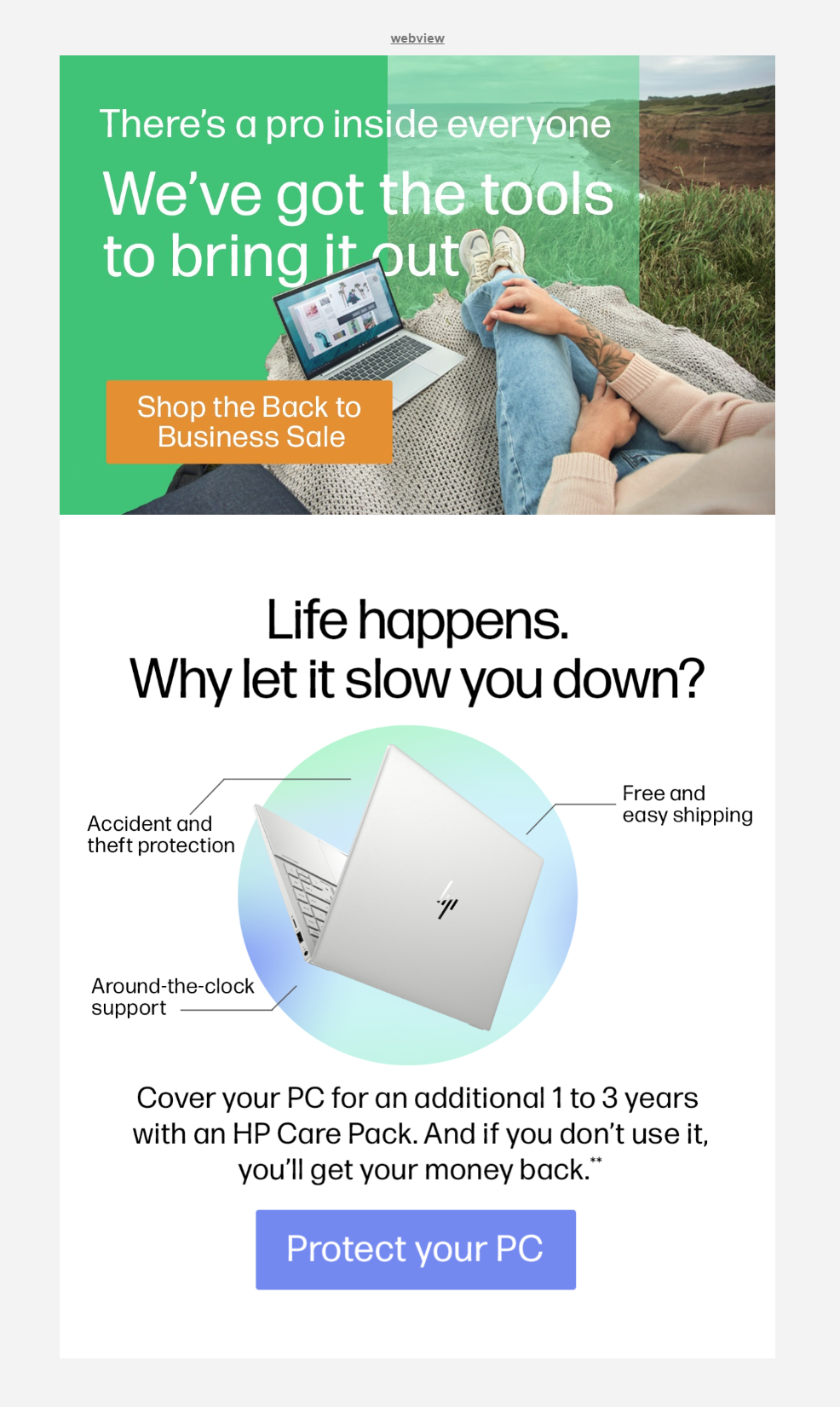
Like HP, using enterprise email marketing software will allow your teams to create various campaigns to increase brand awareness, educate your audience, and boost your conversions.
Additional Resources for Enterprises That Want to Change Software
If your enterprise is already using email software, you can consider the following resources to get more information on popular alternatives.
- Best Mailchimp Alternatives
- Best SendGrid Alternatives
- Best ActiveCampaign Alternatives
- Best Marketing Automation Software Tools
For more guidance, consult our email software evaluation guide.
Choosing the Right Enterprise Email Marketing Software
Selecting the right email marketing tool is essential for any enterprise aiming to scale its marketing efforts.
Each platform we reviewed has certain advantages and disadvantages that you should consider. Moosend, for example, excels in automation and segmentation, ActiveCampaign provides advanced marketing automation for more experienced teams, while Marketo is ideal for B2B lead generation and nurturing.
Assessing their features against your needs will help you choose the most suitable email service provider to help your teams run efficient campaigns, without compromising security.
So, what’s the next step?
You can start by trying any available free trials and scheduling demos to see how each platform works. For more details, it’s highly advisable to contact their sales teams to find out more about the features, functionality, and pricing of each software.
If you need more details about Moosend’s Enterprise plan and how it’ll accommodate your needs, you can reach out to our sales team.
FAQs
Here are some common questions regarding email marketing services for enterprises.
1. How does enterprise email marketing software differ from standard email marketing tools?
Unlike standard tools that are suitable for small businesses and medium-sized organizations, enterprise email marketing solutions support larger-scale operations, more sophisticated reporting, extensive integration with enterprise resource planning (ERP) systems, customer relationship management (CRM) tools, and other enterprise management software. They also offer premium customer support and SLA.
2. What key features should I look for in enterprise email marketing solutions?
Enterprise-oriented software should offer, among others, advanced automation and workflow capabilities, detailed analytics, A/B testing, integration with numerous applications, user permission settings, robust segmentation tools, SSO, SAML and compliance with data protection regulations (GDPR, CAN-SPAM Act, etc.).
3. Can enterprise email marketing software be integrated with other applications?
Yes, one of the benefits of enterprise email service providers is their ability to integrate seamlessly with other business systems such as CRMs, ERPs, content management systems (CMSs), and analytics tools. This integration helps in synchronizing data and automating marketing workflows.
4. What are some of the top enterprise email marketing software platforms?
Some top platforms suitable for enterprises include Salesforce Marketing Cloud, Adobe Marketo, HubSpot Marketing Hub, ActiveCampaign and Moosend. Each platform offers unique email marketing features that may suit different business needs and goals. Omnisend, Klaviyo, Drip and Constant Contant also offer enterprise plans you can consider.
5. Is there a trial period for enterprise email marketing services?
Many enterprise email marketing service providers offer a demo or a trial period to try their platform before purchasing. This can range from a few days to a month or more, depending on the provider.
6. What kind of support can I expect with enterprise email marketing software?
Enterprise support options often include 24/7 phone support, dedicated account managers, online chat, extensive knowledge bases, and community forums.
7. How do email marketing platforms for enterprises handle data security and privacy?
Email marketing platforms for large businesses adhere to strict data security and privacy standards, including compliance with regulations such as GDPR, HIPAA, and others. Features typically include data encryption, regular security audits, and user access controls.

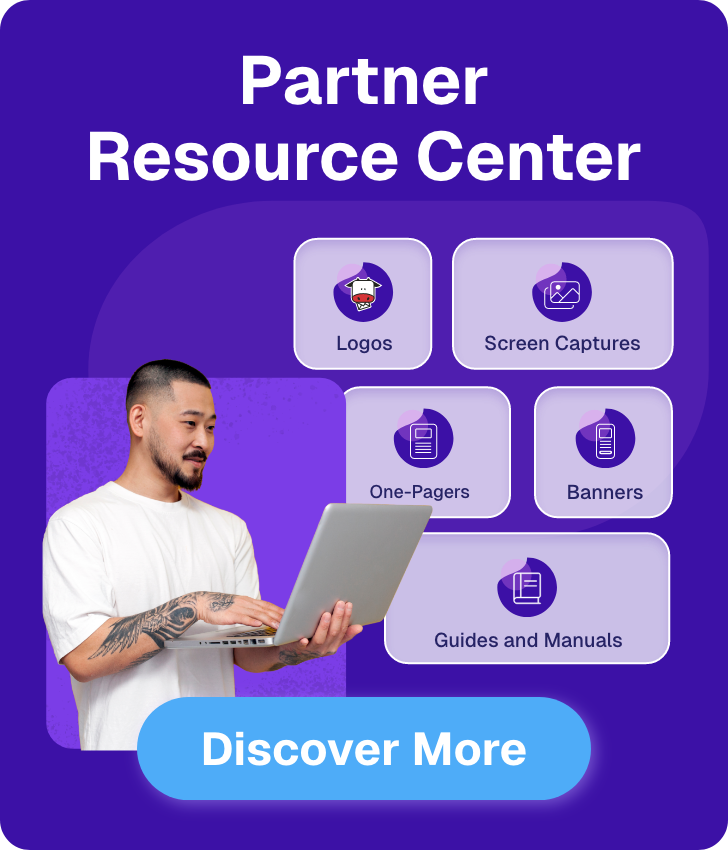


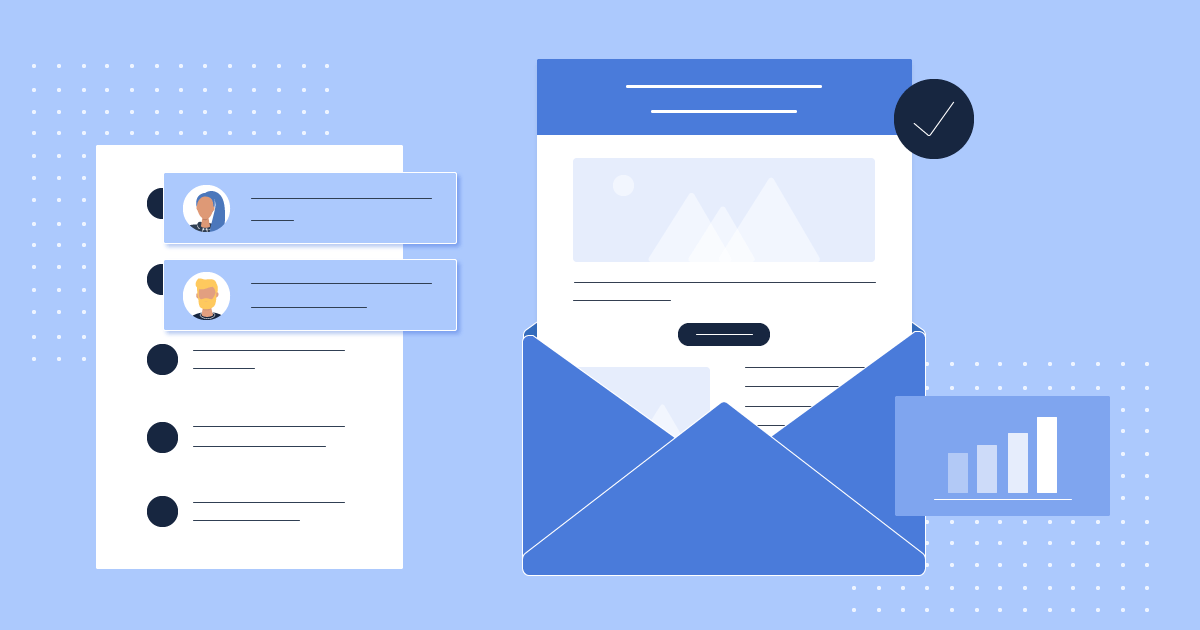
 Published by
Published by
